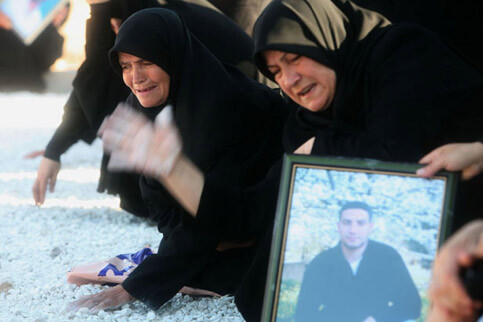Human Rights Watch 22 September 2006

Women gather at a Muslim cemetery in Ayta As Shab to mourn relatives killed in the conflict. (UNHCR/A.Branthwaite)
The Israeli government committee that will investigate the government’s handling of the recent war in Lebanon should also examine the decisions and policies that led to the large number of Lebanese civilian casualties, Human Rights Watch said today. In a report issued on August 3, 2006, Human Rights Watch documented Israeli forces’ systematic failure to distinguish between combatants and civilians as required by international humanitarian law. Subsequent Human Rights Watch reporting demonstrated a similar pattern in Israel’s use of cluster munitions.
The government announced on September 17 that it has convened a five-member Governmental Investigative Committee, headed by retired justice Eliyahu Winograd, to look into the decisions of the country’s “political echelon and defense establishment” leading up to and during the conflict. Prime Minister Ehud Olmert appointed the committee’s members, resisting calls for a state commission of inquiry in which the head of the Supreme Court selects the commission members. The government did, however, invest the committee with the authority to subpoena witnesses and, reportedly, to recommend prosecution of any public official it considers to have been responsible for willful or negligent criminal behavior.
The committee’s mandate is to investigate the preparedness of the security forces, the management of the fighting, and the decision-making processes. The committee will present its findings and recommendations to the prime minister and the minister of defense, and its report will be made public.
“Civilians suffered unnecessarily on both sides of the Israel-Lebanon border,” said Sarah Leah Whitson, Middle East and North Africa director at Human Rights Watch. “The Winograd committee should examine Israel’s part to ensure that such needless killing is never repeated.”
Human Rights Watch said the Winograd committee should investigate in particular: why so many civilian vehicles and homes were targeted in southern Lebanon despite the absence of military justification; why Israeli forces shelled parts of southern Lebanon with large numbers of cluster munitions especially in the last days of the fighting; and why certain civilian infrastructure was targeted even though the harm to civilian life outweighed any military advantage.
Human Rights Watch has called on the U.N. Security Council to authorize an international investigation into the responsibility of all parties to the war, including Hezbollah, for civilian deaths in Lebanon and northern Israel. Human Rights Watch has also criticized the Human Rights Council’s resolution calling for a commission of inquiry that would focus only on Israel’s abuses during the war. “Since the Lebanese government is not in a position to investigate Hezbollah’s conduct, the burden falls to the international community,” said Whitson.
The head of the Israeli committee, Justice Winograd, is a former president of the Tel Aviv Magistrate Court. The other committee members are law professor Ruth Gavison and political science professor Yehezkel Dror of Hebrew University, in addition to two reserve officers, Maj. Gen. Menachem Einan and Maj. Gen. Dr. Haim Nadel.
Israel’s State Comptroller, Micha Lindenstrauss, has also instructed his office to examine government conduct and policies during the war. In addition, the Israeli Defense Ministry has formed a separate military panel, headed by Gen. (Res) Doron Almog, to look into preparedness issues surrounding Hezbollah’s July 12 attack that captured two soldiers and killed several others. General Almog is the former head of the IDF’s Southern Command, responsible for Gaza Strip operations. In September 2005, a London magistrate issued a warrant for Gen. Almog’s arrest on suspicion of committing a grave breach of the Fourth Geneva Convention in connection with IDF home demolition policies in the southern Gaza Strip. Gen. Almog avoided the warrant by not disembarking from his plane in London.
Related Links